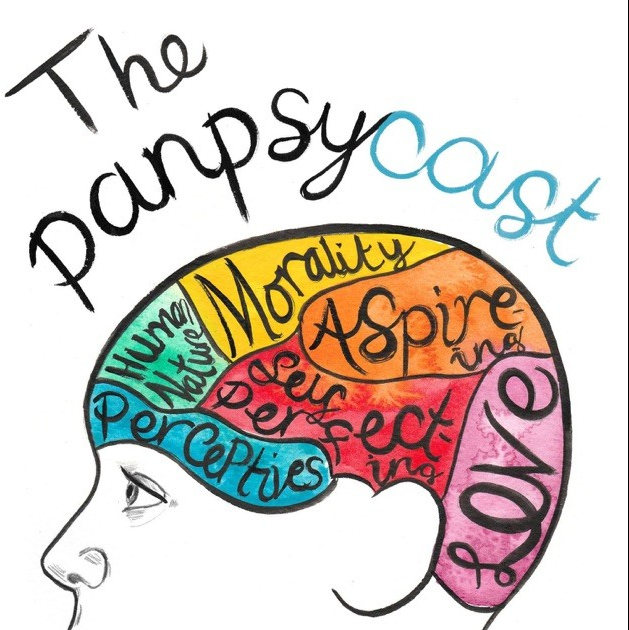The Panpsycast Philosophy Podcast
Subject: Philosophy
Type: Podcast
Hosts: Jack Symes, Olly Marley, Andrew Horton and Rose de Castellane

How long is it?
There are 132 episodes and many have been split into parts. They can be anywhere between 25 minutes and 1 hour 25 minutes in length.
Is it easy to understand?
Everything is well-explained and engaging.
Who is it for?
It is aimed at anyone with an interest in philosophy, particularly teenage students.
How recent is it?
The Panpsycast Philosophy Podcast started in 2016 and continues to release new episodes.
The A. C. Grayling Interview
The Abigail Thorn Interview
The Absurd
Albert Camus
Albert Camus’ The Fall
Animal Rights
‘Animals in Transhumanism’ with Michael Hauskeller
Aquinas’ Natural Law
Aristotle’s Basic Philosophies
Aristotle’s Nicomachean Ethics
‘Art and the Future’ with Vid Simoniti
Arthur Schopenhauer
‘The Awe-Some Argument’ with Ryan Byerly
The Banality of Evil
Buddhism
‘The Building Blocks of Reality’ with Donnchadh O’Conaill
Business Ethics
‘Changing Minds’ with Robin McKenna
‘Christian Animal Ethics’ with David Clough
Christian B. Miller and ‘The Character Gap’
Christianity, Gender and Society
The Christmas Special
‘The Concept of Beastliness’ with Ellie Robson
Confucianism
Conscience
Conspiracy Theories
Corey Mohler: Behind Existential Comics
The Cosmological Argument
The Daniel Dennett Interview
Daniel Hill on Platinga’s Reformed Epistemology
The David Chalmers Interview
David Pearce on Transhumanism
‘The Dialectics of Nothingness’ with Gregory S. Moss and Takeshi Morisato
‘Domestic Labour’ with Paulina Sliwa & Tom McClelland
Dostoevsky’s Notes from Underground
Dualism and Materialism
‘The End of Everything: Astrophysically Speaking’ with Katie Mack
Epictetus: A Guide to Stoicism
Epicurus and the Art of Happiness
‘The Ethics of Art’ with Daisy Dixon
Euthanasia
Existentialism and Romantic Love with Skye Cleary
Flowers for Algernon
‘Football’ with Stephen Mumford
Four Thousand Weeks
Franz Kafka’s Metamorphosis
Friedrich Nietzsche
Friedrich Nietzsche – with Mark Linsenmayer and Gregory Sadler
The Galen Strawson Interview
‘Galileo’s Error’ with Philip Goff
‘The Given – Experience and its Content’ with Michelle Montague
God and Suffering: Live in Liverpool
‘The Golden Age of Female Philosophy’ with Rachel Wiseman
Hedda Hassel Mørch: Consciousness and Integrated Information Theory
‘How Male Privilege Hurts Women’ with Kate Manne
How to Save the World from Financialisation’ with Grace Blakeley
‘Human Nature’ with Steven Pinker and Rutger Bregman
‘The Idealism and Pantheism of May Sinclair’ with Emily Thomas
‘In Defence of God’s Goodness’ with Jack Symes
‘Intellectual Seemings’ with Laura Gow
Jean-Paul Sartre
John Locke’s Political Philosophy
John Stuart Mill’s Political Philosophy
Joseph Fletcher’s Situation Ethics
‘Justice for Animals’ with Martha Nussbaum
Kantian Ethics
Karl Marx’s Political Philosophy
‘Lessons from Lockdown’ with Vittorio Bufacchi
Ludwig Wittgenstein with Prof. Richard Gaskin
Meta-Ethics
Mind, Body and Consciousness
Moral Lucck
The Mystery of Consciousness
The Mystery of Existence
‘Narrative Critique’ with Rachel Fraser
‘The Nature of Consciousness’ with Susan Blackmore
The Nature or Attributes of God
‘The New Age of Empire’ with Kehinde Andrews
Niccolò Machiavelli
‘Nudges’ with Thomas Schramme
‘Offensive Language’ with Rebecca Roache
The Ontological Argument
‘Pantheism: Personhood, Consciousness and God’ with Sam Coleman
‘Pantheism and Panentheism’ with Andrei Buckareff
The Patricia Churchland Interview
‘Perfect Me’ with Heather Meadows
Peter Adamson and the History of Women in Philosophy
The Peter Singer Interview
Philip Goff and David Papineau Debate: ‘Can Science Explain Consciousness?’
‘The Philosopher Queens’ with Rebecca Buxton and Lisa Whiting
‘Philosophy in Everyday Life’ with Philosophy Now’s Rick Lewis
‘The Philosophy of Buddhism’ with Jay Garfield
‘The Philosophy of Hinduism’ with Jessica Frazier
‘The Philosophy of Islam’ with Mohammad Saleh Zarepour
‘The Philosophy of Perception’ with Bence Nanay
The Philosophy of Privacy
Plato’s Apology: Socrates on Trial
Plato’s Cave
Plato’s Crito: Socrates in Prison
Plato’s Euthyphro: Socrates Accused
Plato’s Phaedo: The Death of Socrates
Plato’s Political Philosophy
‘Playfulness Versus Epistemic Traps’ with C. Thi Nguyen
Pride and Anger
The Problem of Evil
‘The Pursuit of Happiness’ with Jeffrey Rosen
‘The Rationality of Theism’ with Silvia Jonas
Rebecca Goldstein: Why Philosophy Won’t Go Away
Religious Experience
Religious Language
René Descartes
The Richard Dawkins Interview
The Richard Swinburne Interview
Romantic Love
Sexual Ethics
Simone de Beauvoir
Stephen Law and ‘The Evil-God Challenge’
The Steven Pinker Interview
Søren Kierkegaard
Talking about Existence
Talking about the Mind
Taoism
The Teleological Argument
Thomas Hobbes’s Political Philosophy
‘Time Travel: The Grandfather Paradox and Abilities’ with Olivia Coombes
Utilitarianism
‘Utopia for Realists’ with Rutger Bregman
Why Buddhism is True with Robert Wright
‘Why Honour Matters’ with Tamler Sommers
The William Lane Craig Interview
Yujin Nagasawa and ‘The Problem of Evil for Atheists’
My thoughts…
Instead of listening to every single episode of The Panpsycast Philosophy Podcast, I decided to listen to the ones whose titles intuigued me. These are my favourites:
- Episode 5, Utilitarianism (Part I, II, II)
- Episode 12, Joseph Fletcher’s Situation Ethics (Part I, II)
- Episode 108, The Richard Dawkins Interview (Part I – Why I’m an Atheist, Part II – Further Analysis and Discussion)
In the context of utilitarianism, is it immoral to produce melancholy art?
I do not think that it is immoral to create art which is sad because it does not contradict the principles of utilitarianism. Utilitarianism says that the right act is the one which results in the greatest good for the greatest number. I think art of all kinds has the potential to result in pleasure, even melancholy art. The artist might gain pleasure as a result of expressing their emotions. The feeling they get may not be happiness, but it is good nevertheless.
Furthermore, anyone who is moved by the art can gain pleasure because it might remind them that they are not alone in their sadness. They might also gain pleasure from the act of simply witnessing the art’s beauty or originality or emotion. Therefore, sad pieces of art would still have a place in a world governed by utilitarian ethics. The artist could choose to create optimistic and joyful art instead, but we cannot say that this decision would result in more pleasure for more people.
How practical are Joseph Fletcher’s situation ethics?
I think that Joseph Fletcher’s situation ethics are not entirely practical because people could justify questionable acts by insisting that they did them in the name of love. The theory also suggests that people should show their enemies unconditional love, which is incredibly difficult to do. As well as this, in order to make a decision, a person is obliged to assess many factors and then determine what the most loving act would be by quantify the lovingness of many possible choices. This requires people not to be influenced by their biases and for everyone to interpret love in a similar way, but this might be impossible. I would argue that love can make people do foolish things, so perhaps love is not the be all and end all of morality.
What is morality if there is no God?
I don’t think ethics rely on theism because we can consider right and wrong and what we want for our society without talking about God. In Britain, our moral standards have changed independently from religious beliefs. People now have more rights than they used to and slavery is much rarer and we have not reached this point by basing our morality on religion. If we were basing our morality on the Bible, we would be stoning people to death, so we much have chosen to disregard religion in order to reach this point where such forms of punishment would be unthinkable. Therefore, ethics are independent from religion; the only way to justify basing morality on Christianity would be to cherry-pick from the Bible, but this would undermine its authority anyway.
